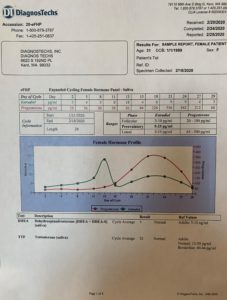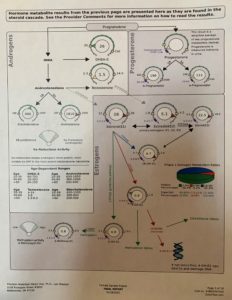Reproductive Hormone Testing
Home » Reproductive Hormone Testing
Reproductive Hormone Testing
A hormone is a regulatory substance secreted by glands in the body and transported to a different organ or structure in order to have an impact on physiology or behavior. Some hormones are relatively straightforward and can be checked through the blood like the thyroid hormone. Other hormones are more complex and require more work to check. One of the most far-reaching set of hormones are the reproductive hormones. These require more work to check and greater interpretation to find problems.
The main reproductive hormones for females are estrogen, progesterone, luteinizing hormone (LH), and follicle stimulating hormone (FSH). LH and FSH are both involved with the maturation and release of an egg from the ovary. Estrogen and Progesterone prepare the uterus for implantation of the egg and then the shedding of the uterine lining if implantation does not occur. These hormones go through a cycle every month in which they ebb and flow at specific times in specific ratios to each other. There are a number of different ways the timing or ratios of hormones could fall out of balance leading to different reproductive issues/concerns
Male Reproductive Hormones
 The main reproductive hormone in males is testosterone. Testosterone levels vary depending on the time of day and day to day. However, testosterone does not go through a cycle like estrogen does in females. Males also have estrogen and progesterone, but these are present at a lower amount than females and are typically stable day to day. FSH and LH both play a role in the production of sperm in males. Just like with females a difference in total levels of one of these hormones or the ration of them together can lead to different reproductive issues or symptoms.
The main reproductive hormone in males is testosterone. Testosterone levels vary depending on the time of day and day to day. However, testosterone does not go through a cycle like estrogen does in females. Males also have estrogen and progesterone, but these are present at a lower amount than females and are typically stable day to day. FSH and LH both play a role in the production of sperm in males. Just like with females a difference in total levels of one of these hormones or the ration of them together can lead to different reproductive issues or symptoms.
With regards to testing there are three main ways to check reproductive hormones. Each test has different pros and cons and checks a different aspect of the reproductive system. In addition, for females, it must be decided whether a one time check or a full cycle check of your hormone levels is warranted. What test is ordered will depend on your symptoms, health history, and individual needs.
Blood Test: All hormones can be checked through a simple blood draw. Depending on the test a specific time of day or day of the month may be necessary to obtain a diagnostic level.
Saliva Test: Saliva tests give the level of hormone that is currently circulating which is “free” or “bioavailable.”
Urine Test: A urine check shows us the total level that was in your system and how it was broken down in order to remove it from your system.
- Allergy Relief (5)
- Autoimmune (3)
- Back Pain (7)
- Chiropractic (9)
- Food Info (3)
- Health Tips (9)
- Internal Medicine (13)
- MLS Laser (5)
- Nutrition (3)
- Office Information (2)
- Recipes (4)
- Testimonials (6)


